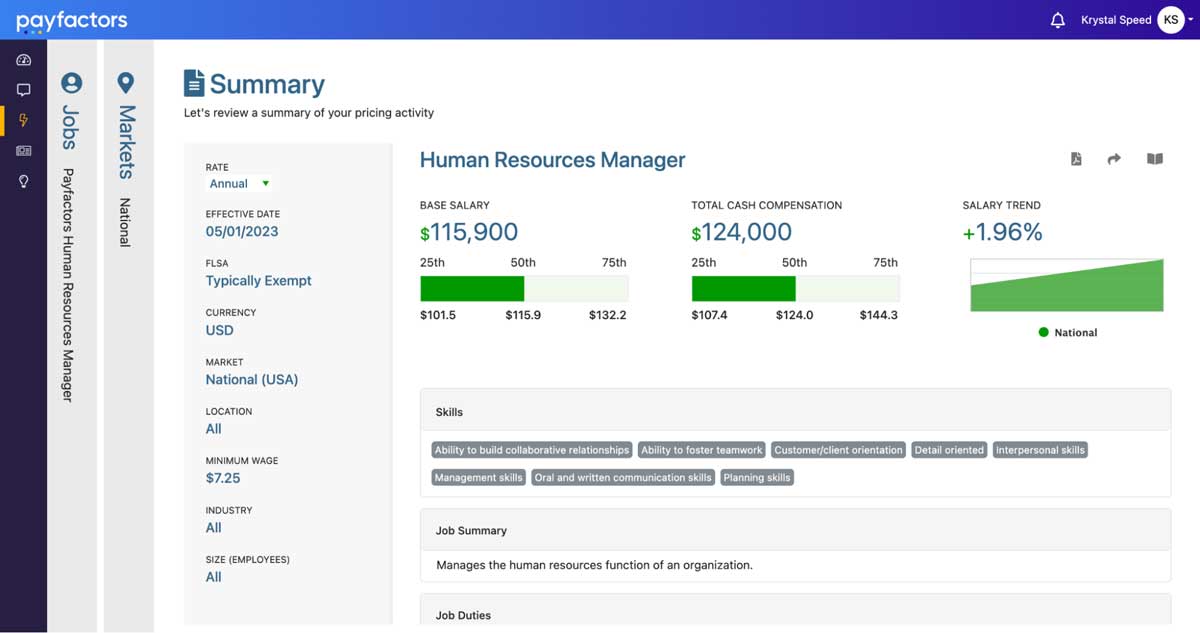We may earn money when you click on links to our partners. Advertiser Disclosure
You have gained traction in the marketplace, are profitable, and future growth is almost certain. Way to go! Now the question, “Should we hire our first HR manager?” is looming.
Whether HR-related tasks are assigned to members of your team out of necessity, you use external resources like a PEO to address HR needs, or you’ve been dealing with it all on your own, you are now wondering if it is time to hire an HR manager.
As your workforce grows, deeper knowledge and expertise concerning people, culture and compliance is needed. Hiring a dedicated HR manager can help relieve some of that pressure while helping your business hire and retain great employees.
Hiring your first HR manager is a big milestone. Let’s explore seven steps that can help make it a smooth process.
Step 1: Define your needs
When hiring your first HR manager, start by defining your current and future business needs. Consider how an HR manager will support your strategic growth goals related to your people and business.
Your first HR manager will likely be a generalist, someone who has experience in a broad range of HR functions. Some of the most important areas to ensure the individual has experience include
- Recruitment and hiring
- Onboarding new employees
- Record keeping and compliance
- Benefits administration
- Employee relations
- Performance management
An HR manager who is able to balance the demands of running an HR department of one while partnering in strategic decision making and leadership is important.
Prioritize experience in specific areas based on your business needs. Determine the level of experience needed, whether mid to senior level, depending on your company culture and complexity. Involve your team in the process and audit current HR processes others currently own to transition them to the new hire.
Your documented needs will become the basis for the job description that you’ll use to find your HR manager.
Step 2: Determine compensation
Using your job specification for a HR manager, decide the compensation for the role. If you’re wondering how to determine an average HR manager annual salary, the good news is that there are various resources that eliminate the guesswork. You can find reliable compensation data (some paid services, some free) to use in this step.
Some of my go-to sources for compensation information include industry-specific salary surveys and compensation planning tools such as Payfactors (Payscale.com’s free version for businesses) and Salary.com. The U.S. Bureau of Labor Statistics is also a great resource to view compensation by role and state. Finally, crowd-sourced websites, like Glassdoor, can provide details on compensation by market.
Most salary surveys will show you data by percentiles. It is important to decide where your organization will fall in those ranges (highly competitive at the 75% percentile, middle of the road at 50% or less competitive at 25%).

Example HR Manager salary report using a national market comparison. Source: Payfactors free account.
Also consider other perks and benefits that will help you attract the best HR talent to your organization. In addition to competitive health benefits, paid time off and flexible work schedules, professional development benefits are especially attractive to HR talent.
“Professional development benefits are especially attractive to HR talent,”
A company-sponsored membership to the Society of Human Resource Managers (SHRM) or educational benefits that can be applied to attaining professional certifications are just two examples.
Saying, “We’ll pay you to get SHRM-CP or SCP certified!” – or any other industry-recognized certification – can help your role stand out amongst other potential employers.
Step 3: Recruit qualified candidates
Now that you’ve identified your needs and the compensation and benefits you’ll offer, it is time to develop a recruitment strategy to help you attract qualified candidates. But where should you start?
There are definitely the commonly-used platforms like LinkedIn, Indeed and Zip Recruiter. But there are a variety of other places where you can find highly-qualified candidates. Local SHRM chapters and the national SHRM job board are excellent resources. Typically the HR professionals in these communities are actively engaged in strengthening their skills and HR knowledge, yielding great potential candidates.
Online communities that are curated specifically for HR professionals based on sector, specializations, geography, and diversity factors abound online. Since they are usually closed to non-HR professionals, it is great to have HR contacts, perhaps through business affiliations, that can share your job posting within these communities of your ideal prospects.
Remember to leverage your networks. Share that you are searching for your first HR manager on your business social media accounts and in your company newsletter. You never know. Your next HR manager may be one of your current followers. Or, perhaps someone that already loves your brand also knows someone that is a perfect fit for this HR role.
Utilize business groups you are affiliated with. Talk with business friends in the Chamber of Commerce, at local networking events, or in online forums to find out where they found their incredible HR managers. This may help uncover other recruitment sources for your hiring needs.
Step 4: Interview candidates
It’s important to have a comprehensive interview process that not only assesses technical skills, expertise, and knowledge but assesses how the candidate aligns with your organization’s values and mission.

When interviewing candidates, utilize a multi-round process. Start with a 15-20 minute screening interview to understand the candidate’s professional background and interest in the role. Also, cover important details about the role, including
- A brief overview of your company
- Areas of responsibility
- Work location
- Salary range (because pay transparency is important)
- Why the role is open
Move to the first round of interviews, asking selected candidates a mix of mission-aligned, values-aligned and role-specific questions. This helps ensure you assess not only technical competencies but also how they may add to your workplace culture and align with company values.
“Use the same questions for each candidate to ensure an equitable and fair process,”
As you advance top candidates to the second interview, this is a great opportunity to see a sample of your top candidates’ work. In this round of interviews you may ask candidates ahead of time to complete a sample task and present their work product in this session. Another option is to provide sample scenarios ahead of time and ask candidates to be ready to share their responses. This provides great insight into their approach to a HR-related task or challenge and how they would address it.
Throughout the interview process utilize behavioral questions to understand how the individual tackled a situation in the past. Use the same questions for each candidate to ensure an equitable and fair process. Also, when possible, conduct group interviews with various members of your team who can speak to the culture, mission and/or specifics of the role.
Example interview questions for an HR position
- What are your salary requirements?
- What types of HR tasks/projects do you most enjoy tackling and why?
- What types of HR tasks/projects do you least enjoy tackling and why?
- How do you stay current on trends, legal changes and best practices in the field of HR?
- What have you found to be 2-3 successful ways to increase employee engagement and foster deeper connections between the employer and employees and within teams?
- Our core values are X, Y and Z. Which of these most often shows up in your work life? Provide an example.
- If you were offered the role of our first HR manager, what would be your top three priorities to tackle within the first 90 days?
- Open enrollment is an important time every year. How have you prepared for open enrollment periods in the past? Describe how you work with brokers, leadership, and employees. What strategies worked well and which didn’t?
- What has been your experience working with HRIS platforms? What are your “must have” features of a good system to support routine HR duties?
- Tell me about a time when you advocated on behalf of employees to leadership regarding a proposed change in the workplace?
- What are your salary requirements?
- What types of HR tasks/projects do you most enjoy tackling and why?
- What types of HR tasks/projects do you least enjoy tackling and why?
- How do you stay current on trends, legal changes and best practices in the field of HR?
- What have you found to be 2-3 successful ways to increase employee engagement and foster deeper connections between the employer and employees and within teams?
- Our core values are X, Y and Z. Which of these most often shows up in your work life? Provide an example.
- If you were offered the role of our first HR manager, what would be your top three priorities to tackle within the first 90 days?
- Open enrollment is an important time every year. How have you prepared for open enrollment periods in the past? Describe how you work with brokers, leadership, and employees. What strategies worked well and which didn’t?
- What has been your experience working with HRIS platforms? What are your “must have” features of a good system to support routine HR duties?
- Tell me about a time when you advocated on behalf of employees to leadership regarding a proposed change in the workplace?
Savvy candidates will “interview” you too, asking questions throughout the process to determine if joining your team is a good next step for their career. Prepare ahead of time to answer potential questions directly and honestly, highlighting what makes your business a great place to work.
Step 5: Conduct pre-employment checks
Pre-employment checks, such as professional reference checks, employment verifications, background checks and/or social media checks, are an important step in any hiring process.
Identify which are necessary (reference and background checks at a minimum) and standard for your company, as well as those necessary for the role. Once you’ve identified your top candidate, inform them of this step of the process and document their consent, as necessary, before executing them.
I do not recommend running your own background or social media checks. Use a verified third-party vendor to do so. HRIS providers such as BambooHR integrate with popular background check services like Checkr to make the screening process even easier.
Check out our employment background check services guide for more information and a short list of vendors we recommend.
Step 6: Make an offer they can’t refuse
When you finally get to this step, you should feel confident that the candidate is the best choice to move into the role of your first HR manager. You and your team have executed a thorough and successful interview process. You’ve already discussed salary expectations, benefits and perks. Now it‘s time to present an offer they can’t refuse.
Bring your best offer to the table (remember to have it vetted by legal) and present it to your candidate. Give them some time to consider it – my standard is 3-5 business days. Make yourself available to answer any questions and engage in conversations related to negotiating any details of the offer.

Step 7: Plan for onboarding your new HR manager
They said “Yes!” Now it’s time to begin planning for onboarding your HR manager.
Send a welcome gift from the team to break the ice and get your HR manager excited about their new role. At least one week before their start date, send an outline of what to expect during the first week as well as a list of new hire paperwork they’ll need to complete.
As you continue to plan out the first 30, 60, and 90 days for your new hire, refer to our onboarding best practices to make sure you don’t miss any important steps.
Pros & Cons of Hiring an HR Manager
- Dedicated person to hire, retain and support employees
- Thought partner for senior leaders
- Greater oversight of compliance
- Proactively addresses and resolves employee relations concerns
- Focuses on improving company culture
- High salary and resource costs
- Employees may resist HR
- Not needed for small firms
Hiring an HR Manager Frequently Asked Questions (FAQs)
The earlier you can get HR support in your business the better. Many new requirements are placed on businesses when they reach 50 employees. So be sure to have someone in place before you hit that milestone.
An HR manager leads a company’s people operations, focusing on attracting and retaining the talent your business needs to grow. This includes hiring, onboarding, employee relations, compliance and reporting, benefits administration, employee engagement, and performance management.
Hiring an HR manager ensures your people needs are addressed by trained and experienced staff. They also free up existing employees’ time to focus on their assigned roles versus HR-related tasks. Businesses with human resource managers leverage their expertise to have a more robust internal HR infrastructure and strategic initiatives around taking care of employees and maintaining a healthy workplace culture.
Growth is a great indicator that it is time to hire an HR manager. This can include when you are anticipating 50%-100% growth in the next 6-12 months or when your headcount is in the double-digits and the needs of your workforce require more specialized support.
The Bottom Line
As your business grows, a skilled and dedicated HR manager can support the needs of your people, create an efficient people operations infrastructure and ensure a healthy company culture. Thoroughly understanding your business needs and what areas of responsibility you will assign to your first HR manager will help you find a great team member.
Remember to include your team and insights from your network to design a recruitment strategy and interview process that will help you find your HR manager. When you do find the best candidate, set them up for success by providing the tools, resources and training to help your team and business succeed!